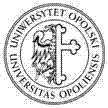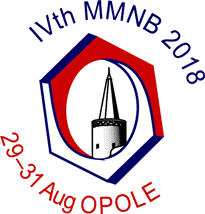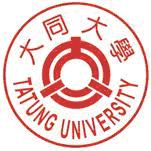From Molecular Modeling to Nano- and Biotechnology 29-31 August 2018, Opole-Groszowice, Poland
 |
 |
 |
Organized by:
- Department of Physical Chemistry and Molecular Modeling, University of Opole, Opole, Poland
- Tatung University, Taipei, Taiwan
- Restauracja Hotel Villa Park, Opole
Honorary Patronage and Sponsors
Conference Program
Abstracts (ZIPed) – download
Gallery
Option: a chapter in Springer book.
There is a possibility to publish a chapter (after a review) in a book.
12-18 chapters are needed, each 20-30 pages. This should be a mini review (not only own results).
If you are interested please inform me by email: teobaldk@gmail.com
Invoice
Please take with you or send by e-mail all information necessary to prepare an invoice containing your conference fee!
Invitation
Dear Colleagues,
on behalf of the organizing committee we have the pleasure to invite you to participate in the 4th Polish-Taiwanese Conference:
“From Molecular Modeling to Nano-and Biotechnology”.
The Conference will be held in Opole, Poland from August 29th to 31st, 2018 at the Villa-Park Opole-Groszowice.
The aim of our interdisciplinary meeting is to bring together specialists of molecular modeling and related fields of research working at the border of nanotechnology and biotechnology. Topics will cover all areas of basic and applied sciences.
The programme of the Conference will comprise full lectures (30 or 45 min.), oral communications (15 min.) and poster presentations. The official language of the Symposium is English.
We wish to encourage young scientists to attend the Conference and to present their own research on the special Young Scientists Session. The best contributions will be awarded. We consider active participation of young scientists to be the meeting’s greatest asset.
WE ARE LOOKING FORWARD TO WELCOMING YOU IN OPOLE!
CONFERENCE COMMITTEES
Honorary Committee:
- Prof. dr hab. Marek Masnyk (Rektor, Opole University)
- Prof. dr hab. inż. Piotr Wieczorek (Dean, Faculty of Chemistry, Opole University)
- Andrzej Buła (Marshall of Opole Voivodeship)
- Arkadusz Wiśniewski (President of Opole)
- Marcin Ociepa (Chairman of the city council)
Scientific Committee:
- Gustavo Aucar (Northeastern University of Argentina, Argentina)
- Małgorzata Broda (University of Opole, Poland)
- Andrzej Eilmes (Jagiellonian University, Poland)
- Ioannis Gerothanassis (University of Joannina, Greece)
- Poul Erik Hansen (Roskilde University, Denmark)
- Karol Jackowski (Warsaw University, Poland)
- Michał Jaszuński (Polish Academy of Sciences, Warsaw, Poland)
- Frank Jensen (Aarhus University, Denmark)
- Paweł Kafarski (Wrocław University of Technology)
- Tapas Kar (Utah State University, USA)
- Anne-Marie Kelterer (Technische Universität Graz, Austria)
- Jacob Kongsted (University of Southern Denmark )
- Jacek Korchowiec (Jagiellonian University, Poland)
- Tatiana Korona (University of Warsaw, Poland)
- Tadeusz M. Krygowski ( University of Warsaw, Poland )
- Teobald Kupka (University of Opole, Poland)
- Feng-Di Lung (Tunghai University, Taichung, Taiwan)
- Hong-Ming Lin (Tatung Technical University, Taipei, Taiwan)
- Volodymir Novikov (Lviv Polytechnic National University, Lvov, Ukraine)
- Kenneth Ruud (Universitetet i Tromso, Norway)
- Joanna Sadlej (University of Warsaw, Poland)
- Leszek Stobiński (Warsaw University of Technology, Warsaw, Poland)
- Ding-Yah Yang (Tunghai University, Taichung, Taiwan)
Organizing Committee:
- Teobald Kupka – chairman
- Hong-Ming Lin – vice-chairman
- Małgorzata Broda – vice-chairman
- Monika Staś / Aneta Buczek / Łukasz Gajda – secretary
- Anna Bihun-Kisiel – member
- Aleksandra Piontek– member
- Łukasz Kołodziej– member
- Adrianna Mnich – member
- Małgorzata Leszczyńska – member
- Anna Jezuita – member
Invited speakers:
The following outstanding scientists have already accepted our invitation
to deliver a lecture:
Prof. Riina Aav (Tallinn University of Technology, Tallinn, Estonia)
Prof. Małgorzata Biczysko (Shanghai University, Shanghai, China)
Prof. Andrzej Eilmes (Jagiellonian University, Poland)
Prof. Ioannis Gerothanassis (University of Joannina, Greece)
Prof. Poul Erik Hansen (Roskilde University, Denmark)
Prof. Yi Hu (Tatung University, Taipei, Taiwan)
Prof. Karol Jackowski (University of Warsaw, Poland)
Prof. Michał Jaszuński (Polish Academy of Sciences, Warsaw, Poland)
Prof. Frank Jensen (Aarhus University, Denmark)
Prof. Paweł Kafarski (Wrocław University of Technology)
Dr. Jakub Kaminský (Czech Academy of Sciences, Prague, Czech Republic)
Prof. Tapas Kar (Utah State University, USA)
Prof. Jacob Kongsted (University of Southern Denmark)
Prof. Jacek Korchowiec (Jagiellonian University, Poland)
Prof. Tatiana Korona (University of Warsaw, Poland)
Prof. Hong-Ming Lin (Tatung University, Taipei, Taiwan)
Prof. Volodymir Novikov (Lviv Polytechnic National University, Lviv, Ukraine)
Prof. Kenneth Ruud (Universitetet i Tromso, Norway)
Dr. Leszek Stobiński (Warsaw University of Technology, Warsaw, Poland)
Prof. Michal Straka (Czech Academy of Sciences, Prague, Czech Republic)
Prof. Peter Tolstoy (St. Petersburg State University, Petersburg, Russia)
Plenary lectures
- Riina Aav „Templated formation of cyclohexanohemicucurbiturils”
- Małgorzata Biczysko “Computational Spectroscopy: From Astrochemistry To Biomolecules”
- Andrzej Eilmes “Insight into Interactions in Condensed Phase from Vibrational Spectra Simulated via Ab Initio Molecular Dynamics”
- Ioannis P. Gerothanassis “NMR in natural products: chemical analysis, monitoring of dynamic changes, “in-cell” NMR and DFT calculated structures based on NMR chemical shifts in solution”
- Poul Erik Hansen “From Monomers to ”Polymers”. A Theoretical NMR Study Involving Charged Alkylpyrroles”
- Yi Hu“Formation of Silver Oxide Particles by Electrochemical Deposition”
- Karol Jackowski “Influence of paramagnetic oxygen on nuclear magnetic shielding of small molecules studied by NMR spectroscopy in the gas phase”
- Michał Jaszuński „Nuclear magnetic dipole moment from NMR experiments: 209Bi”
- Frank Jensen “Method Calibration or Data Fitting?”
- Jakub Kaminsky “Vibrational Optical Activity And Saccharides”
- Tapas Kar “Can doping and charge modulation make Boron-Nitrogen nano-materials an attractive adsorbent for toxic gases?”
- Jacob Kongsted „Excited States in Complex Systems through Polarizable (Density) Embedding”
- Jacek Korchowiec “Modeling Monolayer Films at Air-Water Interface”
- Tatiana Korona „Exploring point defects in hexagonal boron-nitrogen monolayers”
- Hong-Ming Lin“Bimetallic Electrocatalysts for Direct Liquid Formic Acid Fuel Cells”
- Kenneth Ruud “Phosphorescence and triplet lasing in organic and organometallic systems”
- Szczepan Roszak “Metal Organic Frameworks – new materials, new chemistry”
- Halina Szatyłowicz “Physical Interpretation of the Substituent Effect – the Quantum Chemistry Approach”
- Peter Tolstoy“Outer Electronic Shell Visualization by NMR Chemical Shift Laplacian of a Helium Probe”
Lectures
- Zofia Drzazga “Uv-Vis Spectroscopy of Blood Serum in Efficiency Evaluation of Athletes in Normobaric Hypoxia”
- Anne-Marie Kelterer „Water-mediated Reaction of Phenol Antioxidant with Peroxyl Radicals”
- Teobald Kupka “Relativistic, Electron Correlation And Basis Set Effects In The Calculation Of Se Chemical Shifts”
- Zbigniew Najzarek “Mechanochemical processes in fluidized bed mills”
- Tadeusz Pluta “Ground and excited states molecular (hyper)polarizabilities”
- Joachim Włodarz „Jupyter: God of Human-Centric Scientific Computing
- Robert Zaleśny “Partitioning of interaction-induced nonlinear optical properties of molecular complexes”
Posters
- Elwira Bisz, Michal Szostak „Cyclic Ureas as Efficient, Sustainable Ligands in Iron-Catalyzed Cross-Coupling of Aryl Chlorides and Tosylates”
- Grzegorz Skrzyński and Tadeusz Pluta „Dynamic polarizability of the weakly interacting Ar2 dimer”
- Nina Szczotka, Borys Ośmiałowski, Robert Zaleśny “Two-Photon Absorption of Fluorescent Difluoroborates: in Silico Studies”
- Petrina Romana, Khomiyak Semen, Krvavych Anna, Konechna Roksolana, Hamada Vira, Lupiy Khrystyna, Ilkiv Bohdan-Volodymyr, Novikov Volodymyr “Biotechnology of Callus Biomass of Plants as an Alternative Method for the Production of Plant Raw Material”
- Fedorova Оlena, Petrina Romana, Zayarnyuk Natalia, Kurka Mariya, Mylyanych Andriy, Novikov Volodymyr „Obtaining of a Combined Therapeutic Cosmetic Based on the Secret of the Snail and Biomass Panax Ginseng”
- Christian Hebenstreit, Aneta Buczek, Małgorzata Broda, Anne-Marie Kelterer “Interactions of 5-Fluorouracil with Water and beta-Cyclodextrin”
- Bartłomiej Dec, Robert Bogdanowicz, Krzysztof Pyrchla, Mateusz Ficek, Michał Sobasze “DFT studies of electrical properties of doped diamond films: surface termination influence”
- Małgorzata Leszczyńska, Krzysztof Ejsmont “Substituent effects in heterocycling fluorene derivatives substituted by fulvene and heptafulvene systems”
- Katarzyna Gajda, Karolina Jasiak, Agnieszka Kudelko, Błażej Dziuk, Bartosz Zarychta, Krzysztof Ejsmont „Crystal, molecular and electronic structures of N’-(2-hetarylmethylidene)-3-(3-pyridyl)acrylohydrazides“
- Łukasz Gajda, Teobald Kupka, Aneta Buczek, Małgorzata A. Broda, Leszek Stobiński “Vibrational and electronic spectra of phthalocyanine-graphen oxide associates”
- Andrzej Kałamarz, Zbigniew Najzarek, Teobald Kupka, Szymon Mycer “From egg shell to mechanochemical preparation of calcium phosphates and biomaterials”
- Wioleta Edyta Śmiszek-Lindert, Elżbieta Chełmecka “Spectroscopic and DFT Studies on Crystalline 3,4′,5-Trihydroxystilbene – Plant Antibiotic”
- Łukasz Kołodziej, Małgorzata Broda, Joanna Nackiewicz „UV-Vis spectra of selected phthalocyanines. Experimental and DFT study”
- Monika Staś, Dawid Siodłak, Małgorzata Broda „Naturally Occurring Amino Acid Residues with Heterocyclic Rings”
- Stadnytska Nataliya, Nakonachna Anna, Karpenko Olena, Shvets Volodymyr, Novikov Volodymyr, Lubenets Vira „Influence of Tiosulphoesters and Compositions with Biosurfactants on the Efficiency of Tomato and Cereal Plants”
- Stadnytska Nataliya, Diakon Iryna, Novikov Volodymyr „New Metods of Fighting with Staphylococcus Aureus B Evcaliptus Viminalis and Cetraria Islandica”
- Yang Yi, Bożena Adrjan, Jun Li, Karol Jackowski, Szczepan Roszak “Chemical Shifts and Shielding Constants of Daidzein and Puerarin Using NMR Measurements and DFT Studies”
- Aleksandra Piontek, Michal Szostak “Iron-Catalyzed C(sp2)–C(sp3) Cross-Coupling of Alkyl Grignard Reagents with Polyaromatic Hydrocarbons”
- Luboš Plamitzer, Miroslav Hájek, Jakub Kaminský, Petr Pachl, Kamil Parkan, Marcela Pávová, Radek Pohl “Enzymatically Stable Galectin Inhibitors”
Young scientists session
- Nina Strasser “Hydrogen Bonding in the System 3-Aminopropanol-Water”
- Marzena Szczepańska „Theoretical investigation on oxygen reaction with palladium porphyrin”
- Kamini Mishra “Synthesis of Cyclohexanohemicucurbit[10-12]urils”
- Anna Jezuita “Substituent Effect on The Electronic Structure of Meta- And Para-Substituted Nitrobenzene Derivatives”
Call for Abstracts
Plenary lecturers and authors of contributed papers (oral communications and posters) are requested to submit an abstract which will be published in the materials of the Conference. The abstracts must be prepared according to Guidelines and submitted before August 15, 2018 to the conference secretary.
Only a limited number of oral communications can be accepted. The Scientific Committee reserves the right to accept papers. Authors will be notified about the acceptance of their contribution before August 20, 2018.
Young Scientist Contest
We wish to encourage young scientists to attend the Conference and to present their own research on the special Young Scientists Session.
The best contributions will be awarded.
GUIDELINES FOR ABSTRACTS AND POSTERS
We invite you all to send in your abstracts for the Conference. They will be published as a Book of Abstracts (on a CD or memory stick).
- Abstracts (1-2 pages) should be submitted by mail or e-mail as an attachment in MS Word file.
- Abstracts should be written in English, preferably in *.doc format (or *.docx).
- Abstract length: maximum 23 cm (including title, authors, authors affiliations, text and references).
- Use margins of 3.0 cm on all sides of the A4 page (21×29.7 cm).
- Font: Times New Roman, size 12, one line spacing.
- Title: CAPITAL LETTERS, on top of page, centered.
- Authors: skip one line after title. Presenting author must come first and his/her name underlined. Please give full names of all co-authors.
- Affiliations: institution, department, city and country: skip one line after authors’ names.
- Text: skip one line from affiliation.
- The figures and pictures can be inserted in the abstract.
An example of abstract can be downloaded here: template
A poster stand A0 will be provided for displaying posters or alternatively several separate sheets.
IMPORTANT DATES AND DEADLINES
FINAL DEADLINES
| Registration: | August 15, 2018 |
| Payment: | August 15, 2018 |
| Accommodation reservation: | August 15, 2018 |
| Registration cancellation: | August 20, 2018 |
| Submission of abstracts: | August 15, 2018 |
| Notification of acceptance: | August 20, 2018 |
| Submission of oral presentations: | August 15, 2018 |
Cancellation policy: Payments cancellations made by August 20, 2018 entitle to a full refund less a 20% administrative fee. After that date, refund requests will not be honored.
Notification of a cancellation must be made in writing to the Secretary via fax or e-mail.
CONFERENCE FEE*
Invoice
Please take with you or send by e-mail all information necessary to prepare an invoice containing your conference fee!
| Conference, hotel for 3 nights and meals: | |
| Full-meeting participant | 950 PLN (230 €) |
| Junior scientist status** | 850 PLN (200 €) |
| Accompanying person | 600 PLN (145 €) |
| Conference fee and meals only: | |
| Full-meeting participant | 700 PLN (160 €) |
| Junior scientist status**: | 600 PLN (145€) |
| Accompanying person | 420 PLN (100 €) |
| Additional (before or after conference) | |
| 1 night hotel + Breakfast | 125 PLN (30 €) |
| 1 day food (lunch + dinner) | 95 PLN (22 €) |
| Coffee break | 25 PLN (6 €) |
* total sum includes 23% VAT (when applicable)
**junior scientist status (students and graduate students) must be confirmed by a letter of recommendation by a supervisor submitted together with the registration form.
Polish participants pay in PLN
The following is included in the full conference fee: conference materials, coffee breaks, lunches, dinners (and optionally 3 nights at the Villa Park Hotel).
Payment should be made to the following account:
Account holder: Restauracja Hotel Villa Park, ul. Czogały 1, 45-625 Opole, Poland
Bank name: Multibank
Account No: 57 1140 2017 0000 4802 0747 5702
SWIFT code (BIC): BREXPLPWMUL
IBAN PL: PL 57 1140 2017 0000 4802 0747 5702
Reference: MMNB2018 (Polish-Taiwanese Conference “From Molecular Modeling to nano- and biotechnology”) and name of participant
Deadlines:
| Payment: | August 15, 2018 |
| Registration cancellation: | August 20, 2018 |
Cancellation policy: Payments cancellations made by August 20, 2018 entitle to a full refund less a 20% administrative fee. After that date, refund requests will not be honored.
ACCOMODATION & BOARD
Accommodation at special Conference rates has been booked at Villa-Park Opole-Groszowice. This is a very well located hotel in a nice park, which provides single and double room accommodation with en suite bathrooms.
The price for one night in double room including breakfast is ca. 125 PLN or 30 € per night per person. Total accommodation fee for three nights is included in the conference fee. Optionally, additional nights (before, or after the Conference) should be paid directly in the Hotel while leaving.
Villa-Park Opole-Groszowice address:
45-625 Opole-Groszowice, 1, Czogały Street (www.villapark.opole.pl)
Phone: +48 77 456 3508; +48 606 884 677, e-mail: hotel@ villapark.opole.pl
Bus lines to Groszowice: 7, 8, 12, 14
The lunches and dinners will be available at the Villa-Park Groszowice-Opole. Please mark on the registration form your request of lunch and/or dinner reservation.
Villa Park
Contact information
All the correspondence concerning the 4th Polish-Taiwanese Conference: “From Molecular Modeling to Nano-and Biotechnology” should be directed by email to the conference secretary(mmnb@uni.opole.pl):
PhD. Aneta Buczek, Sc. Monika Staś, M. Sc. Łukasz Gajda,
Faculty of Chemistry University of Opole
48, Oleska Street
45-052 Opole, POLAND
You may also contact: Dr hab. Teobald Kupka, Prof. U. O. – chairman
teobaldk@gmail.com; teobald@uni.opole.pl
phone: +48 665 921 475
conference logo: Dominik Tabisz
website: Józef Hurek
